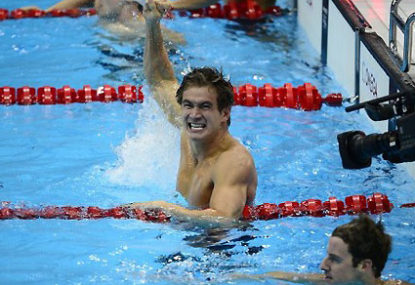JackJumpers' NBL title was special - but where does it sit among Tasmania’s top ten sporting moments?
It’s a pretty good time to be a Tasmanian sports fan right now. After years in the sporting wilderness with not much to celebrate,…

Witnessing Australia’s recent failures in the pool and subsequent recriminations, you’d be forgiven for thinking no one beats us any more – that we only beat ourselves.
Such is the lapse in sportsmanship that critics and athletes alike seem to canvass the nuts and bolts of how ‘we lost’, rather than how the winners won.
We can blame social media for turning us into navel-gazing whingers, or the pressures of a ‘whatever it takes’ mantra of taxpayer accountable sport funding, but it still boils down to an erosion of competitive grace.
Our swimmers at the current ‘worlds’ in Barcelona should be made to view the post race interviews of American winners like Missy Franklin and Kate Ledecky.
“It’s an incredible honour to be here and compete against the best in the world” they both gushed and bubbled.
Scripted? You bet!
But aren’t most responses from what we like to call ‘our better nature’?
Alicia Coutts apparently came in for some vicious taunts from the Twittersphere for crying over a recent relay loss. While abuse is no way to vent national frustrations, there is a collective sentiment out there saying our teams seem to be acting like spoilsports.
One of the first things budding swimmers used to be told is never to rain on the winner’s parade. And raining tears on the winners parade – crying – was always held up as the cardinal sin of bad sportsmanship.
If such restraint was once expected of 10 year olds, our grown up swimmers should be able to bottle it for a moment and let the victors enjoy their spoils.
A 15 year old girl I coach on the Gold Coast will soon spend a week at the AIS in a squad of hand picked ‘future internationals’, courtesy of tax payers.
Her parents had to sign a twenty page document covering everything from duty-of-care caveats to brand protection agreements. Nowhere was anything said about the sportsmanship that would be expected of the participants.
The girl, whose nickname is “Mo”, is also dux of her grade at school, rides horses, plays both the flute and piano and surfs.
Yet she finds time for up to nine swim sessions a week. She has never raised even an eyebrow of dissent in her 10 years with me.
When her parents asked if I was okay with the AIS camp, I had to warn them about the minority ratbags and brats her daughter might be exposed to.
But Mo is pretty sharp when it comes to picking her friends and I told her parents she totally deserved the week mixing with elite peers she has – for the most part – always admired.
I have no idea why sportsmanship is no longer a non-negotiable tenet of swimmer indoctrination.
Maybe it’s perceived as arcane and pedantic. Which is a shame, because sportsmanship is actually self serving.
Experience shows that junior athletes who can at least triumph at being a good sport tend to last longer, while dummy spitters quit as soon as the opportunity presents itself.
When a young losing competitor takes care not to detract from the winner’s joy, he or she will strive even harder to enjoy the limelight themselves.
Reports are filtering through that our Barcelona team, led by James Magnussen, is more in touch with its feminine, softer side and offering emotional support to each other.
This is commendable, but unless it is complemented by honouring their opponents as well, it will only be a bandaid on a big gash in our swimming culture.
A former coach of mine had a favourite saying that I once had trouble understanding, but which is now clear. It went “believe in yourself to challenge, but believe in your opponent to win”.
Maybe if our teams believed in their opponents a bit more, we’d see more of those close finishes converted into wins.